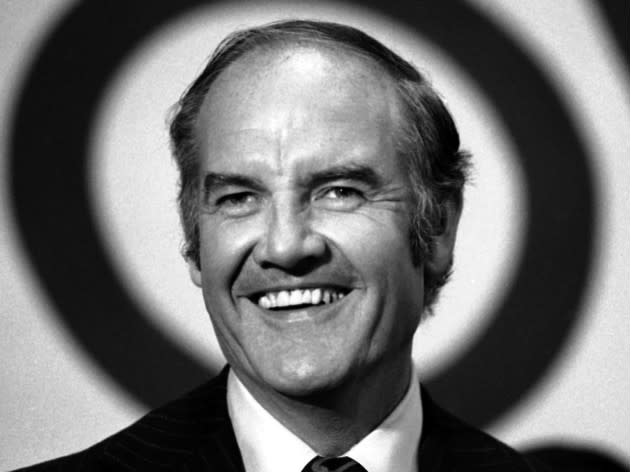 The Ticket
The TicketGeorge McGovern dead at 90: Die-hard liberal drubbed by Nixon in 1972 election

George McGovern, former U.S. senator and Democratic presidential nominee who ran against Richard Nixon in 1972, died early Sunday, his family said. He was 90.
"Our wonderful father passed away peacefully at the Dougherty Hospice House in Sioux Falls, S.D., surrounded by our family and life-long friends," his children said in a statement. "We are blessed to know that our father lived a long, successful and productive life advocating for the hungry, being a progressive voice for millions and fighting for peace. He continued giving speeches, writing and advising all the way up to and past his 90th birthday, which he celebrated this summer."
McGovern, a three-term senator from South Dakota, ran a disastrous 1972 campaign, grabbing just 17 electoral votes on an anti-war platform. Nixon took 520--one of the biggest routs in American presidential election history.
Nixon, the incumbent, had just become ensnared in the Watergate scandal that would eventually throttle the White House, but McGovern "could not escape the embarrassing missteps of his own campaign of 1972," the Associated Press said. "The most torturous was the selection of Missouri Sen. Thomas F. Eagleton as the vice presidential nominee and, 18 days later, following the disclosure that Eagleton had undergone electroshock therapy for depression, the decision to drop him from the ticket despite having pledged to back him '1,000 percent.'"
Eagleton was replaced with R. Sargent Shriver on McGovern's ticket. The pair wound up with just 38 percent of the popular vote, carrying only Massachusetts and the District of Columbia.
Via Time magazine:
The egalitarianism inherent in McGovern's agenda seemed too radical to a country that still trembled after the perturbing 1960s, a decade of protests and social experimentation. Instead, Americans re-elected Richard Nixon with his promise of stability and his faith in individual endeavor, finding comfort in his evocation of Eisenhower era family values. Shortly after, the country would be rewarded for its choice with one of its worst political scandals—and Nixon would resign a presidency ravaged by Watergate.

"If we had run in '74 instead of '72, it would have been a piece of cake," McGovern joked in 2005.
McGovern, "a slender, soft-spoken minister's son newly elected to Congress ... went to Washington as a 34-year-old former college history teacher and decorated bomber pilot in World War II," David Rosenbaum, the late Washington correspondent for the New York Times, wrote in McGovern's pre-written obituary published by the paper Sunday. (Rosenbaum died in 2006.)
The South Dakotan "thought of himself as a son of the prairie as well, with a fittingly flat, somewhat nasal voice and a brand of politics traceable to the Midwestern progressivism of the late 19th century. Elected to the Senate in 1962, Mr. McGovern left no special mark in his three terms, but he voted consistently in favor of civil rights and antipoverty bills, was instrumental in developing and expanding food stamp and nutrition programs, and helped lead opposition to the Vietnam War in the Senate."
He lost a bid for the Democratic presidential nomination in 1968, but gained momentum in the 1972 primary.
[Related: McGovern an unwavering, often unrequited, liberal]
The 1972 Democratic National Convention, however, was "filled with intramural wrangling and speeches that verged on filibusters," the AP said. "By the time McGovern delivered his climactic speech accepting the nomination, it was 2:48 a.m., and with most of America asleep, he lost his last and best chance to make his case to a nationwide audience."
He'd had enough when a young man at the airport fence in Battle Creek, Mich., taunted that Nixon would clobber him. McGovern leaned in and said quietly: "I've got a secret for you. Kiss my ass." A conservative Senate colleague later told McGovern it was his best line of the campaign.
McGovern, the Los Angeles Times said, was a "liberal standard-bearer," "a war hero who opposed the Vietnam War" and "a die-hard idealist [who] inspired scores of budding politicians."
His campaign left a significant legacy, including his proposals, since fulfilled, that women be appointed to the Supreme Court and nominated for the vice presidency. He inspired scores of budding politicians: Bill Clinton was his Texas coordinator before becoming governor of Arkansas, then president. Gary Hart was his campaign manager before becoming a senator from Colorado, then a candidate for the White House.
McGovern was a die-hard idealist. His electoral loss embittered him, but not for long. He never abandoned his optimism or his faith in humanity. Neither did he give up his devotion to liberalism or what colleagues called his extraordinary sense of decency.
"For many years, I wanted to run for the presidency in the worst possible way," he said at a 1973 dinner. "And last year, I sure did."
McGovern won re-election to the Senate in 1974, losing a bid for a fourth term in 1980. He made another presidential bid, in 1984, but lost the Democratic nomination to Walter Mondale.
He taught at several schools, including Columbia and Northwestern University, during his post-Senate career, and was appointed ambassador to the United Nations Food and Agriculture Organization in Rome by President Bill Clinton. And in 2001, McGovern was named the first United Nations global ambassador on hunger.
